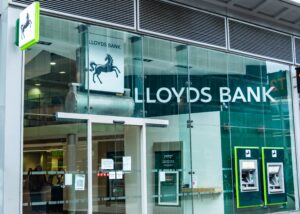
Profits at Lloyds Banking Group tumbled 26% in the three months to September as the UK’s largest mortgage lender steeled itself for a potential surge in defaults as it predicted house prices would fall 8% next year.
The drop in profits was much larger than the 9.5% analysts had expected, and was the result of having to put aside an extra £668m amid fears that some loan and mortgage customers could default on their debts.
Lloyds is expecting inflation to peak at 10.7% by the end of this year, and unemployment to rise to 5.5% by early 2024, further squeezing household finances.
William Chalmers, the bank’s chief financial officer, said that, when combined with rising borrowing costs, those factors were expected to push UK house prices down 8% and weigh on mortgage lending.
Analysts had expected the bank – which owns Halifax – to put aside only £285m for bad loans this quarter.
The higher-than-expected provision for defaults pushed Lloyds’ pre-tax profits down to £1.5bn in the third quarter, lower than average forecasts for £1.8bn. That was despite rising interest rates, which have increased the cost of borrowing for loan and mortgage customers but propped up a key revenue stream for banks.
Lloyds said the 19% rise in net interest income, which accounts for the difference between interest earned on loans and paid out for savings, to £3.4bn was “more than offset by the impairment charge in light of the deterioration in the macroeconomic outlook”.
Chalmers said he hoped the UK’s new cabinet under Rishi Sunak would provide stability after a turbulent period that sent mortgage interest rates to levels not seen since 2008.
“The one request would be for a period of stability … that in turn will help us to support customers, retail, commercial and insurance, navigate what will be a tougher macro environment going forward,” Chalmers told journalists on Thursday.
In the meantime, he said the bank was “likely to see a bit of a slowdown in mortgage lending” over the next year, due to higher interest rates and the tougher economic environment.
The bank’s chief executive, Charlie Nunn, tried to offer some reassurance to borrowers who have been squeezed by a rise in inflation and a rising borrowing costs. “The current environment is concerning for many people and we are committed to maintaining support for our customers,” he said.
“The group’s resilient business model and prudent approach to risk position the group well to face the current macroeconomic uncertainties while generating enhanced returns for our shareholders.”
Read more:
Lloyds bank predicts 8% fall in house prices as its profits tumble






